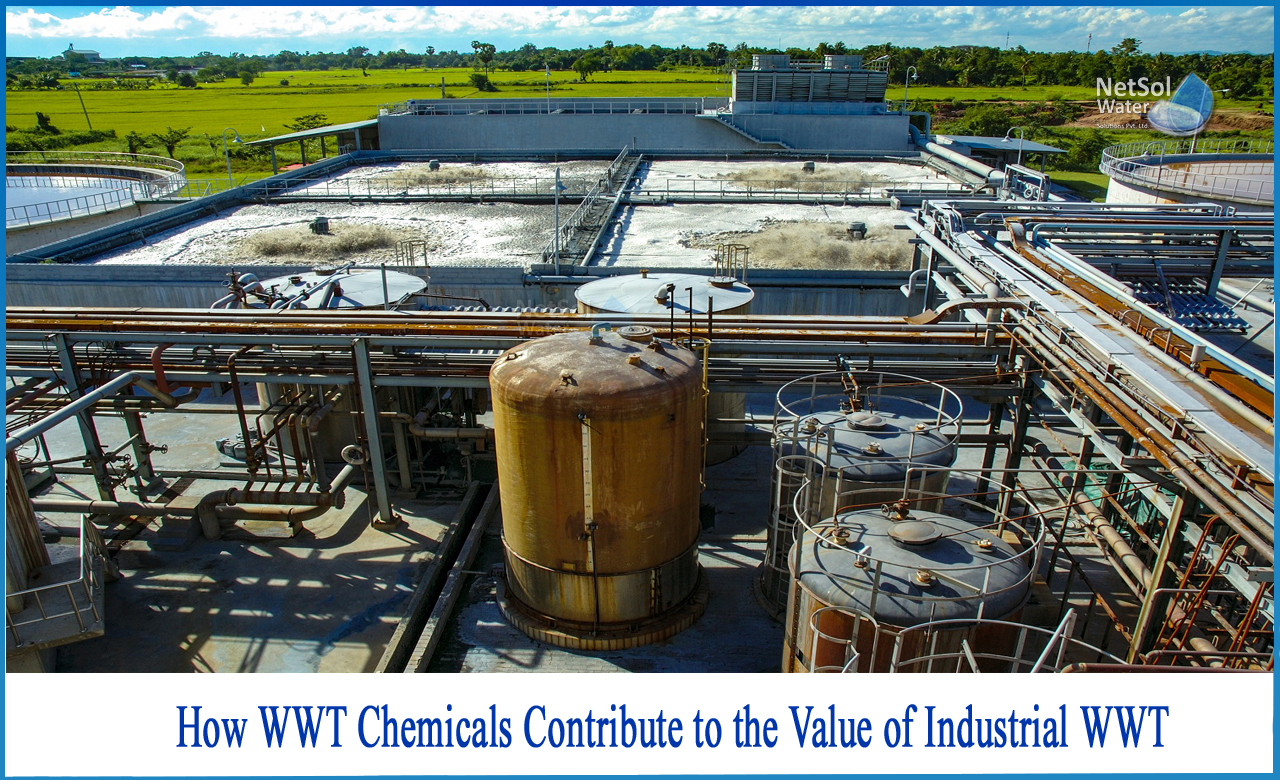How WWT chemicals contribute to the value of Industrial WWT?
Wastewater treatment chemicals are becoming more significant in the effluent wastewater treatment process. Because of increased operating expenses and rigorous administrative considerations, there is now a greater need than ever before to optimize operational performance. Fortunately, emerging innovations are assisting businesses in improving procedures while lowering regulatory costs. Companies who collaborate with Netsol Water achieve more consistent outcomes, allowing plants to run at higher levels of efficiency.
In primary industrial treatment, several chemicals are employed to clear wastewater. They are classified as follows:
- pH adjustment chemicals
- Coagulant chemicals
- Flocculent chemicals
Chemicals for pH correction
Chemicals used to regulate the pH of wastewater serve to change the ionic charge of the effluent.
The pH is stated quantitatively, with values ranging from 0 to 14. A pH of 7.0 is neutral, pH less than 7.0 is acidic, and pH more than 7.0 is basic or alkaline.
Changing the ionic charge of wastewater alters the solubility of specific materials and causes physical objects to attract each other. Choosing chemicals to alter wastewater pH necessitates consideration of the wastewater's chemical composition.
The following basic or alkaline compounds are used to increase the pH of wastewater:
Because of their availability, cheap cost, and high capacity, CaO (calcium oxide or lime), MgO (magnesium oxide), Ca (OH) (calcium hydroxide, a hydrated version of lime), and Mg (OH) (magnesium hydroxide) are the most widely used compounds. Sludge bulk (volume) is a significant issue, however recovery is achievable. Lime is often rich in calcium and is available as quicklime or hydrated. It is sold dry and must be combined with water to produce a slurry before usage.
Sodium hypochlorite (caustic soda), Sodium hydroxide (NaOH) is a cost-effective, controlled, and widely accessible chemical. It is often utilized for modest or infrequent applications, or where limiting sludge deposits is desired.
Sulphuric acid (H2S04) is the cheapest and most widely accessible acidic chemical for lowering wastewater pH. It is very corrosive, thick, oily, and clear or dark brown in colour (depending on purity). It is available in a variety of grades ranging from 60 to 94 percent H2SO4. It is noncorrosive to steel drums in the 93 percent grade; however, after dilution, it becomes very corrosive.
Carbon dioxide (CO2) and sulphur dioxide (SO2) in gaseous form may be used if accessible. Flue gases are readily available and cost-effective for neutralizing alkaline fluids in some sectors.
In addition, waste streams with concentrated high or low pH can be utilized to alter the pH of other waste fluids rather than employing chemicals to do so.
Coagulating substances
Coagulant chemicals are used in wastewater treatment to modify the pH and start the coagulation of particles in the wastewater. Choosing chemicals to coagulate solids in wastewater necessitates consideration of the wastewater's chemical composition.
The following compounds are used to coagulate sediments in wastewater:
Aluminium Chloride, Ferric Chloride, Aluminium Sulfate, and Ferric Chloride (FeCl3).
Coagulant chemicals are used to alter pH, and the pH is adjusted using these chemicals.
Chemicals that are flocculent
Flocculent chemicals, which are mainly synthetic and have no impact on pH, are used in wastewater treatment to flocculate and remove solids from cleared wastewater. Choosing chemicals to flocculate and separate particles in wastewater necessitates consideration of the effluent's chemical composition. Chemicals used to flocculate and separate particles in wastewater utilizing quick mixing and mild agitation are classified as several types of polymers, which are listed below for your convenience:
1: Anionic polymers contain a negative charge in the wastewater and are used to separate solids using a quick mix and mild agitation.
2: Non-ionic polymers have a neutral charge in wastewater and are used to separate solids using a quick mix and mild agitation.
3: Cationic polymers contain a positive charge in the wastewater and are used to separate solids using a quick mix and mild agitation.
4: Polymers are often acquired in concentrated dry or liquid form and combined in water to a certain percent solution (e.g., 2% solution) before usage.
How can Netsol Water help?
Netsol Water provide complete project support, from professional advice on proposals to ongoing maintenance performed by our specialized staff of experts. We also provide process assurances, which provide you piece of mind that the needed performance will be met on a constant basis.
Netsol Water is Greater Noida-based leading water & wastewater treatment plant manufacturer. We are industry's most demanding company based on client review and work quality. We are known as best commercial RO plant manufacturers, industrial RO plant manufacturer, sewage treatment plant manufacturer, Water Softener Plant Manufacturers and effluent treatment plant manufacturers. Apart from this 24x7 customer support is our USP. Call on +91-9650608473, or write us at enquiry@netsolwater.com for any support, inquiry or product-purchase related query.



